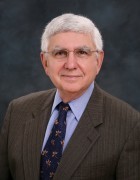23 Feb Testosterone Improves Anemia and Bone Strength, Worsens Coronary Plaque and Has No Effect on Memory
MedicalResearch.com Interview with:
Ronald S. Swerdloff, MD
Chief of the Division of Endocrinology, Department of Medicine and
Director of a World Health Organization Collaborative Center in Reproduction
a Mellon Foundation Center for Contraceptive Development and a
NIH Contraceptive Clinical Trial Center
Director of the Harbor-UCLA Reproductive Program
LA BioMed Lead Researcher
David Geffen School of Medicine
UCLA Health
MedicalResearch.com: What is the background for this study?
Response: While we have long known that testosterone levels decrease as men age, very little was known about the effects of testosterone treatment in older men with low testosterone until last year.
Our team of researchers from LA BioMed and 12 other medical centers in the U.S., in partnership with the National Institute on Aging, conducted a coordinated group of seven trials known as The Testosterone Trials (TTrials). We studied the effects of testosterone treatment for one year as compared to placebo for men 65 and older with low testosterone. The TTrials are now the largest trials to examine the efficacy of testosterone treatment in men 65 and older whose testosterone levels are low due seemingly to age alone.
The first published research from the TTrials last year reported on some of the benefits to testosterone treatment. We have now published four additional studies in the Journal of the American Medical Association (JAMA) and JAMA Internal Medicine that found additional benefits and one potential drawback.
MedicalResearch.com: What are the main findings?
Response: The recently released studies reported that testosterone treatment improved bone density and anemia for men over 65 with low testosterone. Testosterone treatment didn’t improve patients’ cognitive function, and it increased the amount of plaque buildup in the participants’ coronary arteries.
Specifically, the research found increased bone density and estimated bone strength in the men who received the testosterone treatments when compared to those on placebo. A larger and longer trial would be needed to determine if testosterone treatment reduces fracture risk.
Testosterone treatment also increased hemoglobin concentrations, corrected the anemia of men who had no other identifiable cause of anemia and corrected the anemia of men who had an identifiable cause, such as iron deficiency. While these conclusions proved testosterone to be beneficial to the participants, testosterone treatment did not improve memory or any other measure of cognitive function.
In the cardiovascular trial, our research team assessed coronary artery plaque buildup by CT angiography. That assessment showed more plaque buildup in men treated with testosterone than in men treated with placebo. Nonetheless, in all 788 men in the TTrials, the number of major adverse cardiovascular events was similar in the men treated with testosterone as in the men treated with placebo.
MedicalResearch.com: What should readers take away from your report?
Response: We want to emphasize that the cardiovascular study was exploratory and emphasizes the need for a large-scale, well-controlled, long-term safety trial to determine if there is an increased risk of heart damage or death. As with all medications, the physician and patient need to balance the benefits and risks of treatment.
Given the other findings regarding anemia, physicians may wish to consider measuring testosterone in men age 65 and older who have unexplained anemia and symptoms suggestive of low testosterone levels.
MedicalResearch.com: What recommendations do you have for future research as a result of this study?
Response: The Testosterone Trials were supported by a grant from the National Institute on Aging (NIA), National Institutes of Health (U01 AG030644). The TTrials were also supplemented by funds from the National Heart, Lung and Blood Institute, National Institute of Neurological Diseases and Stroke, and National Institute of Child Health and Human Development. AbbVie (formerly Solvay and Abbott Laboratories) also provided funding, AndroGel, and placebo gel.
In addition to LA BioMed, the TTrials were conducted at Albert Einstein College of Medicine, Baylor College of Medicine, Brigham and Women’s Hospital, University of Alabama at Birmingham, Northwestern University Feinberg School of Medicine, Puget Sound Health Care System, University of California at San Diego School of Medicine, University of Florida School of Medicine, University of Minnesota School of Medicine, University of Pennsylvania Perelman School of Medicine, University of Pittsburgh School of Public Health and Yale School of Medicine.
Ronald S. Swerdloff, MD, is co-author of the four studies, an LA BioMed lead researcher and Harbor-UCLA Medical Center Division of Endocrinology chief. For more information, please visit www.labiomed.org
MedicalResearch.com: Thank you for your contribution to the MedicalResearch.com community.
Citation:
Note: Content is Not intended as medical advice. Please consult your health care provider regarding your specific medical condition and questions.
More Medical Research Interviews on MedicalResearch.com
Last Updated on February 23, 2017 by Marie Benz MD FAAD

